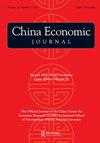China trade with belt and road countries: the role and impact of institutions
IF 2.3
Q1 ECONOMICS
引用次数: 6
Abstract
ABSTRACT This article investigates the impact of institutional quality on China’s trade with belt and road economies by testing the augmented gravity model framework. Our empirical analysis is based on 16 years of balanced panel data of 65 belt and road economies. We use the instrumental variable estimator developed for a panel data model to address the potential endogeneity issue. We distinguish the vital role of institutions in trading partner countries in shaping this result. Our outcomes outline an interesting story about the association between institutional quality and China’s export to and import from belt and road countries. We find that the weaker voice and accountability and political stability in B&R countries negatively affect China exports, while China import from B&R economies shows a statistically positive effect of institutions. Our findings are robust to employs a panel pseudo-maximum likelihood (PPML) estimation method. As part of wider trade integration, we conclude that the B&R countries should strengthen their institutions. The results of this study have several implications for policymakers.中国与“一带一路”国家的贸易:制度的作用和影响
本文通过检验增强引力模型框架,考察制度质量对中国与“一带一路”经济体贸易的影响。我们的实证分析基于65个“一带一路”经济体16年的均衡面板数据。我们使用为面板数据模型开发的工具变量估计器来解决潜在的内生性问题。我们认为,贸易伙伴国的机构在形成这一结果方面发挥了至关重要的作用。我们的研究结果勾勒出一个有趣的故事,讲述了制度质量与中国对“一带一路”国家进出口之间的关系。我们发现,“一带一路”国家话语权、问责制和政治稳定的减弱对中国出口产生了负面影响,而中国从“一带一路”经济体的进口则显示出统计上的积极影响。我们的发现是稳健的采用面板伪极大似然(PPML)估计方法。作为更广泛的贸易一体化的一部分,我们得出结论,“一带一路”国家应加强其机制。这项研究的结果对政策制定者有几点启示。
本文章由计算机程序翻译,如有差异,请以英文原文为准。
求助全文
约1分钟内获得全文
求助全文

 求助内容:
求助内容: 应助结果提醒方式:
应助结果提醒方式:


